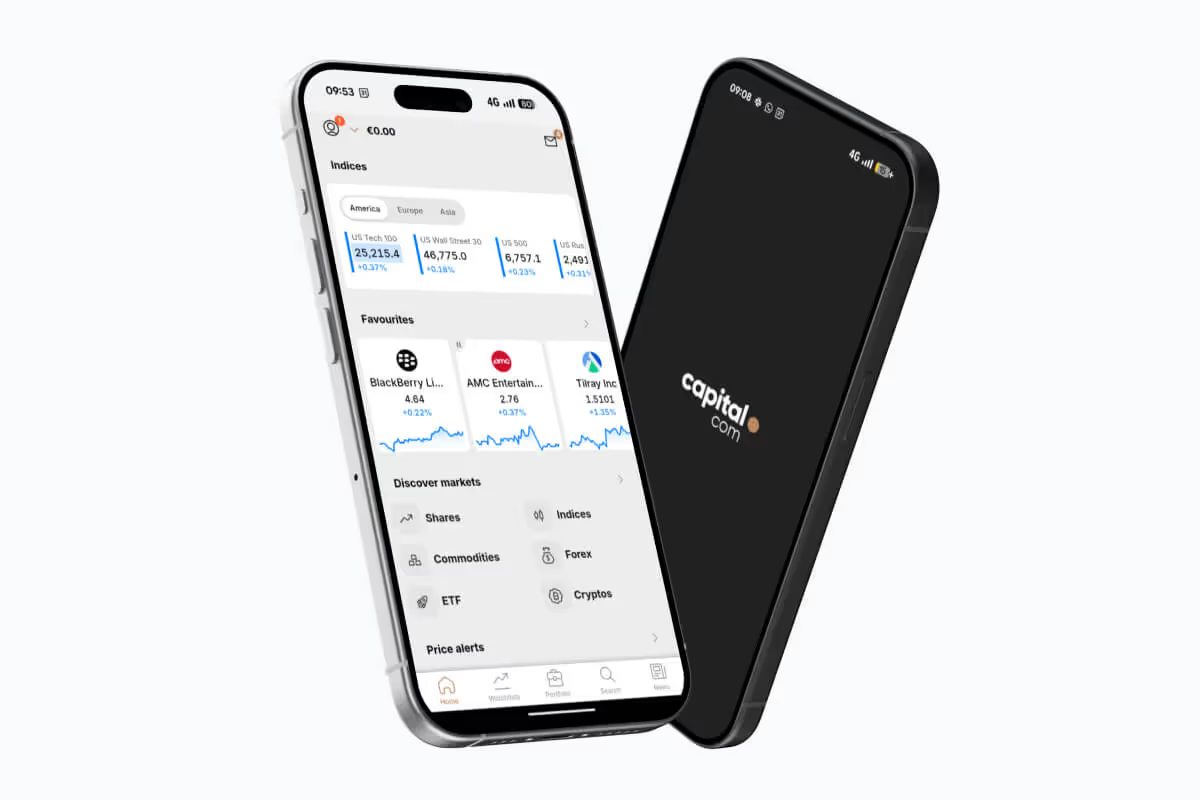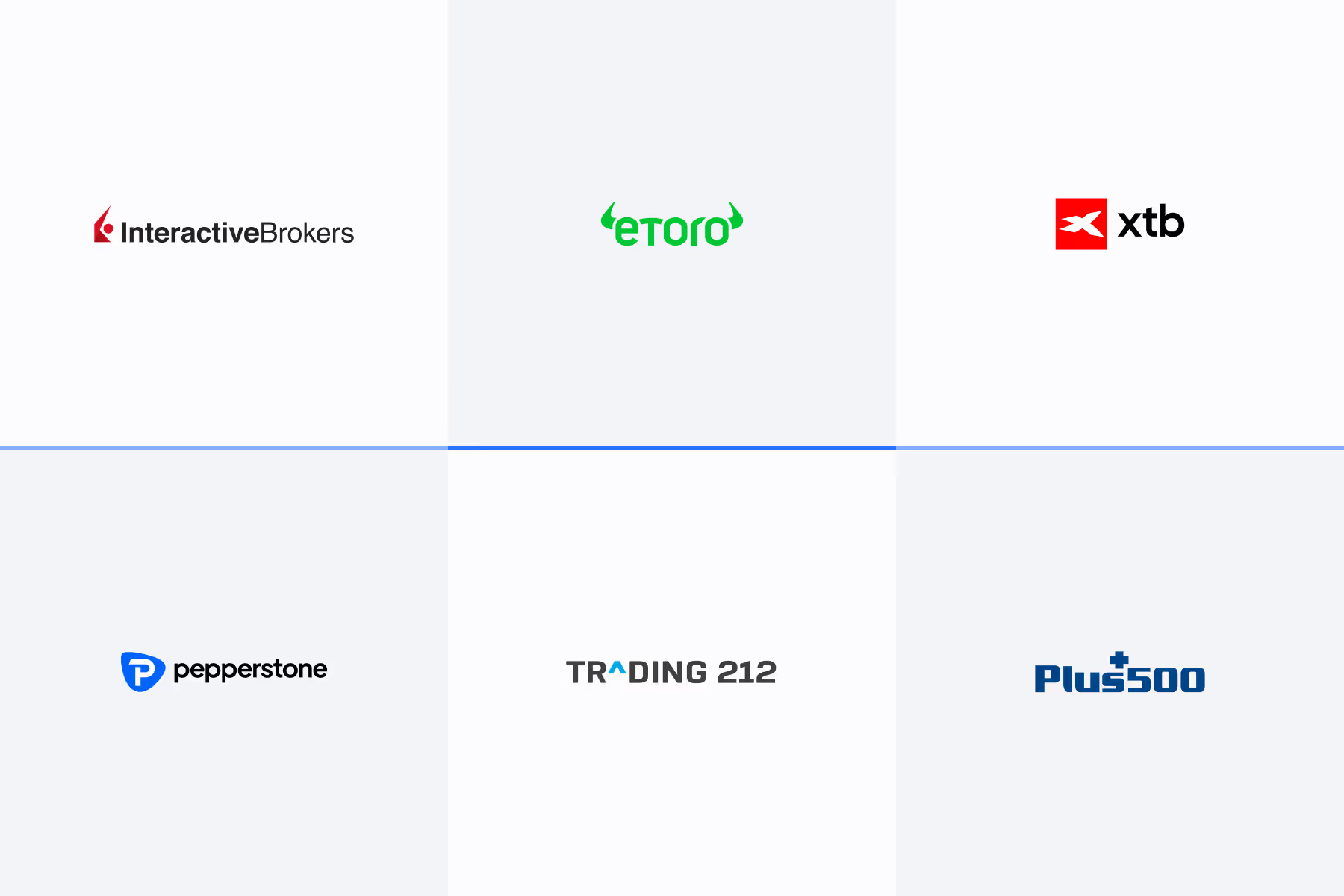


Disclaimer: Day trading involves a high level of risk and may not be suitable for all investors. Financial markets are highly volatile and can lead to substantial capital losses, especially when leverage is used.
For more experienced European traders or those looking to start short-term trading on a daily basis, finding the best platform for your specific trading style is crucial.
Each brokerage brings something different to the table - whether that’s lightning-fast execution, advanced charting tools, an intuitive interface, deep market access, or a simple fee structure you can actually wrap your head around.
So, to help guide you around all these differences, we’ve reviewed some of the best brokers in Europe for day trading. Because day trading isn't just about speed and low fees, we’ve carried out a deep dive into each of these European brokers to show you how they compare.
The best brokers for day trading in Europe
- Interactive Brokers: The most complete broker in Europe for serious day traders, offering ultra-low fees, direct market access, and advanced tools via TWS or IBKR Mobile. It’s the biggest broker by assets in Europe.
- eToro: Best for beginners wanting to learn from others, eToro combines day trading with social features like CopyTrader, mainly focused on CFDs. Offers a welcome bonus in Europe worth up to $500.
- XTB: Best for European day traders interested in forex and short-term CFD trading, with fast execution, built-in news, and excellent tools via the intuitive xStation 5 platform.
- Pepperstone: Best choice for forex and CFD day traders using MetaTrader or cTrader, offering ultra-tight spreads and lightning-fast execution.
- Trading 212: Best brokerage for traders looking for a beginner-friendly app for CFD and stock trading with a simple interface, technical price charts, no commissions, and competitive interest on uninvested cash. New users earn a free fractional share.
- Plus500: Best for casual day traders who want a simple and fast platform without the complexity of advanced tools.
For most day traders in Europe, Interactive Brokers stands out as a top-tier choice, offering unmatched market access, ultra-low fees, and professional tools.
If you’re looking for a simple way to earn interest on uninvested cash while trading, both Trading 212 and XTB offer that added benefit.
Meanwhile, if you’re a beginner or prefer low-cost, user-friendly platforms, brokers like eToro, XTB, and Plus500 offer accessible options with competitive fees and intuitive interfaces designed for short-term traders.
⚠️ Important: Day trading is simply the practice of buying and selling financial instruments within the same trading day in an effort to profit from - or hedge against - short-term price movements. However, multiple reports from European regulators and supervisory authorities (such as ESMA) indicate that between 70% and 80% of retail investors lose money when day trading leveraged products like CFDs.
We prepared this article after noticing a significant rise in searches for “best day-trading brokers” in Europe. Our goal is to offer a clear, balanced overview that helps readers understand the risks before they open an account and start trading.
Review of each broker
Interactive Brokers (IBKR)
- Minimum deposit: €0
- Leverage: EU-regulated limits (up to 30:1 for FX; lower for other assets)
- CFDs: Stocks, ETFs, forex, indices, commodities
- Regulator in Europe: Central Bank of Ireland (CBI)
- Demo account: Yes
.png)
Founded in 1978 and listed on NASDAQ (ticker: IBKR), Interactive Brokers is one of the most renowned and innovative brokers globally. It’s the industry benchmark when it comes to top-tier day-trading platforms and a popular choice for day traders across Europe. Its institutional-grade technology, ultra-low trading fees, and wide range of supported markets make it ideal for active traders who need reliability, speed, and precision.
Interactive Brokers provides European day traders with access to a vast selection of assets, including stocks, ETFs, options, futures, forex, and even cryptocurrencies, through regulated partners. Traders benefit from direct market access (DMA), lightning-fast execution, and deep liquidity, all crucial elements for intraday trading.
The pricing structure is also attractive for day traders and investors:
- US stocks: from $0.005 per share ($0.35 minimum)
- European ETFs: 0.05% per order (€1.25 minimum, €29 maximum)
- Options & futures: competitively priced with tiered plans based on volume
- Mutual funds: €0 - €4.95
In terms of regulation, "Interactive Brokers Ireland Limited," the subsidiary through which European investors register, is regulated by the Central Bank of Ireland (CBI). Assets (including cash) are protected up to €20,000 as part of the Investor Compensation Scheme (ICCL).
In summary, Interactive Brokers is one of the top platforms for day traders in Europe, thanks to its direct market access, advanced trading tools, extensive product range, and low commissions. Whether you're trading stocks, options, CFDs or forex daily, IBKR gives you the precision and speed needed to stay competitive.
Want to learn more? Read our Interactive Brokers review.
Note: Interactive Brokers offers two commission plans: "Tiered" and "Fixed". The commissions mentioned here refer to the "Tiered" plan, which, based on our experience, is the most cost-effective option. Most day traders opt for the Tiered plan because it rewards higher frequency activity with lower per-trade costs.
Pros
- Institutional-grade platforms and tools
- Direct Market Access (DMA)
- Tight spreads and volume-based commissions
- Full support for short-selling and margin trading
- Advanced order types (OCO, bracket, trailing stop, etc.)
- Real-time data, screeners, and research tools
- Two apps to choose from: IBKR Mobile and IBKR GlobalTrader
- Low commissions for US stocks
- Wide range of global assets
- Demo account available
- Excellent reputation (founded in 1978)
- Supports multiple currencies and pays interest on uninvested cash
Cons
- Complicated and time-consuming account opening process (but entirely online)
- Steep learning curve for beginners
- Calculating fees can be complex
- Not the most intuitive mobile interface
- Limited crypto access (only via regulated partners)
- Best pricing comes only with high trade volumes
eToro
- Minimum deposit: $50
- Leverage: EU-regulated limits (up to 30:1 for FX; lower for other assets)
- CFDs: Forex, stocks, indices, commodities, crypto
- Regulator in Europe: CySEC (Cyprus)
- Demo account: Yes
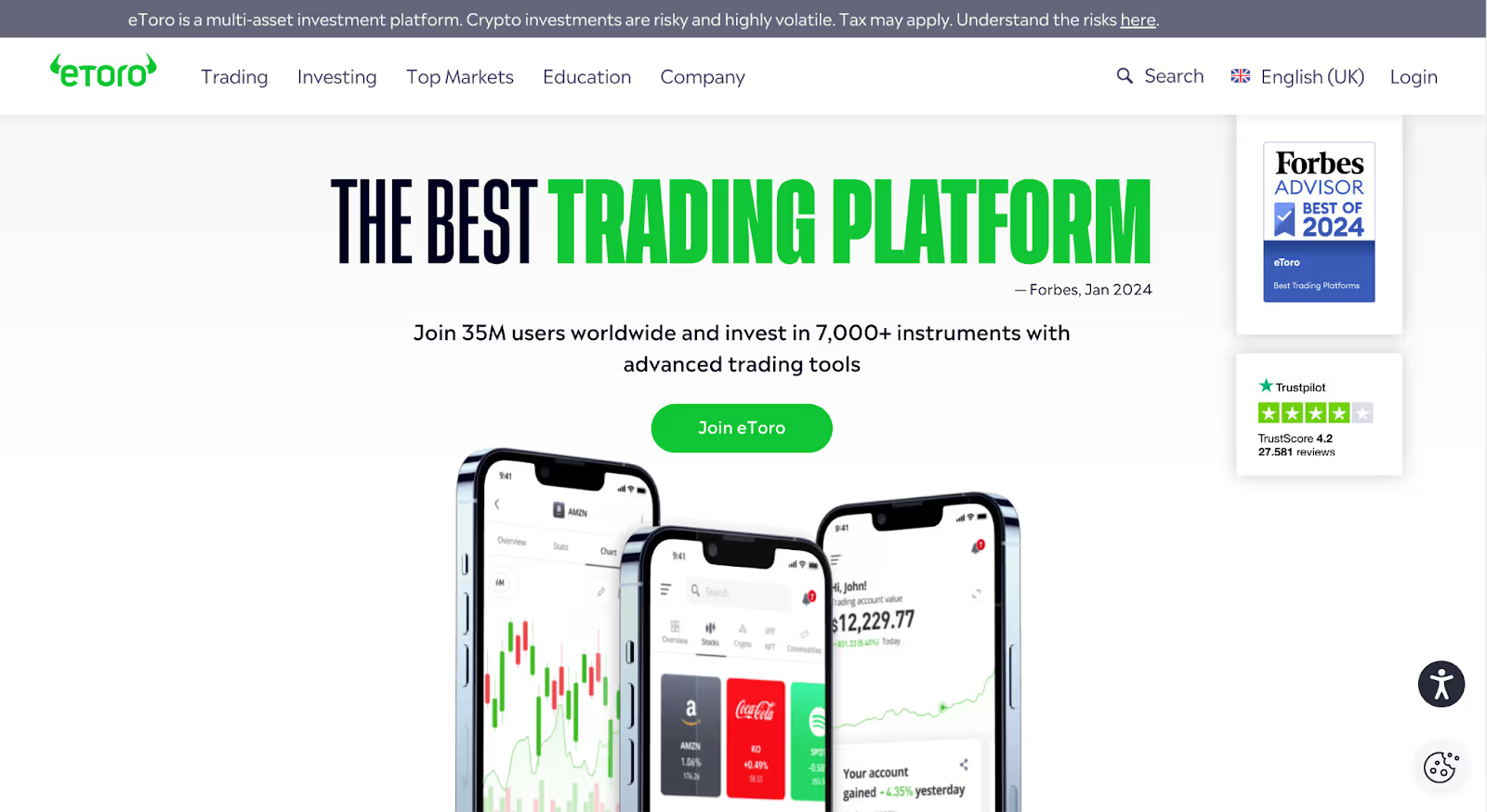
Founded in 2007, eToro has grown into one of the most widely used and beginner-friendly trading platforms globally. It recently went public with an initial public offering (IPO) listing on the Nasdaq exchange in the US (ticker: ETOR).
It’s particularly well-known for pioneering social trading with its in-app “CopyTrader” feature, which allows users to follow and automatically copy the day trades of other investors. For European day traders, it offers a diverse asset mix (stocks, forex, indices, commodities, crypto CFDs) and a model that enhances decision-making through transparency of other traders’ actions.
Execution is straightforward with spread-based pricing (EUR/USD around 1 pip) and no hidden commissions, although the spread levels are generally wider than those of institutional-grade brokers. That trade-off is balanced by eToro’s user-friendly interface and built-in social functionality, which appeals to active traders who want both guidance and immediate access.
Here’s a pricing overview for day traders:
- Forex: spreads from approximately 1 pip
- Crypto CFDs: typical spreads around 1% + overnight fees
- Stock/ETF CFDs: spread-based; no added commission
It's important to note that all accounts are USD-based, meaning a 0.5% currency conversion fee applies when depositing or withdrawing euros. This can be avoided if you deposit in Euros using eToro’s Money wallet (a separate app).
In Europe, eToro operates under a European license via CySEC, ensuring compliance with MiFID II regulations. This means that investor protection is in place, with compensation available for up to €20,000 under the Investor Compensation Fund (ICF) in Cyprus.
The platform is best suited for casual and beginner traders, thanks to its intuitive app, ready-made “Smart Portfolios”, and active investor community. For those looking to try before committing funds, eToro offers a demo account with $100,000 in virtual funds.
In summary, eToro is an excellent platform for European day traders who want to combine active CFD trading with innovative social trading features. It may not suit ultra-fast scalpers seeking the tightest spreads, but it shines for traders who value community insights and ease of use alongside real-time execution.
Pros
- Strong social trading tools (CopyTrader, News Feed)
- Broad asset coverage: stocks, forex, crypto, commodities, indices
- Demo account available
- Commission-free trading on ETFs (other fees apply)
- Invest from $10
- Low commission for stocks
- Innovative thematic “Smart Portfolios”
- Regulated within the EU (CySEC)
Cons
- Spreads wider than institutional brokers (~1 pip EUR/USD)
- No direct market access or advanced order types
- Limited charting and technical tools compared to pro platforms
- Overnight and crypto CFD fees can add up
- Not ideal for high-frequency or scalping strategies due to the spread structure
- 0.5% EUR currency conversion fee on deposits/withdrawals - can be avoided by depositing using eToro Money wallet
- Withdrawal fee of $5
- Inactivity fee of $10 per month after 12 months
- USD-only account base
For a more detailed analysis, read our eToro review.
XTB
- Minimum deposit: €0
- Leverage: EU-regulated limits (up to 30:1 for FX; lower for other assets)
- CFDs: Stocks, ETFs, forex, indices, commodities, cryptocurrencies
- Regulator in Europe: Cyprus Securities and Exchange Commission (CySEC), Polish Financial Supervision Authority (KNF), and other regulators.
- Demo account: Yes
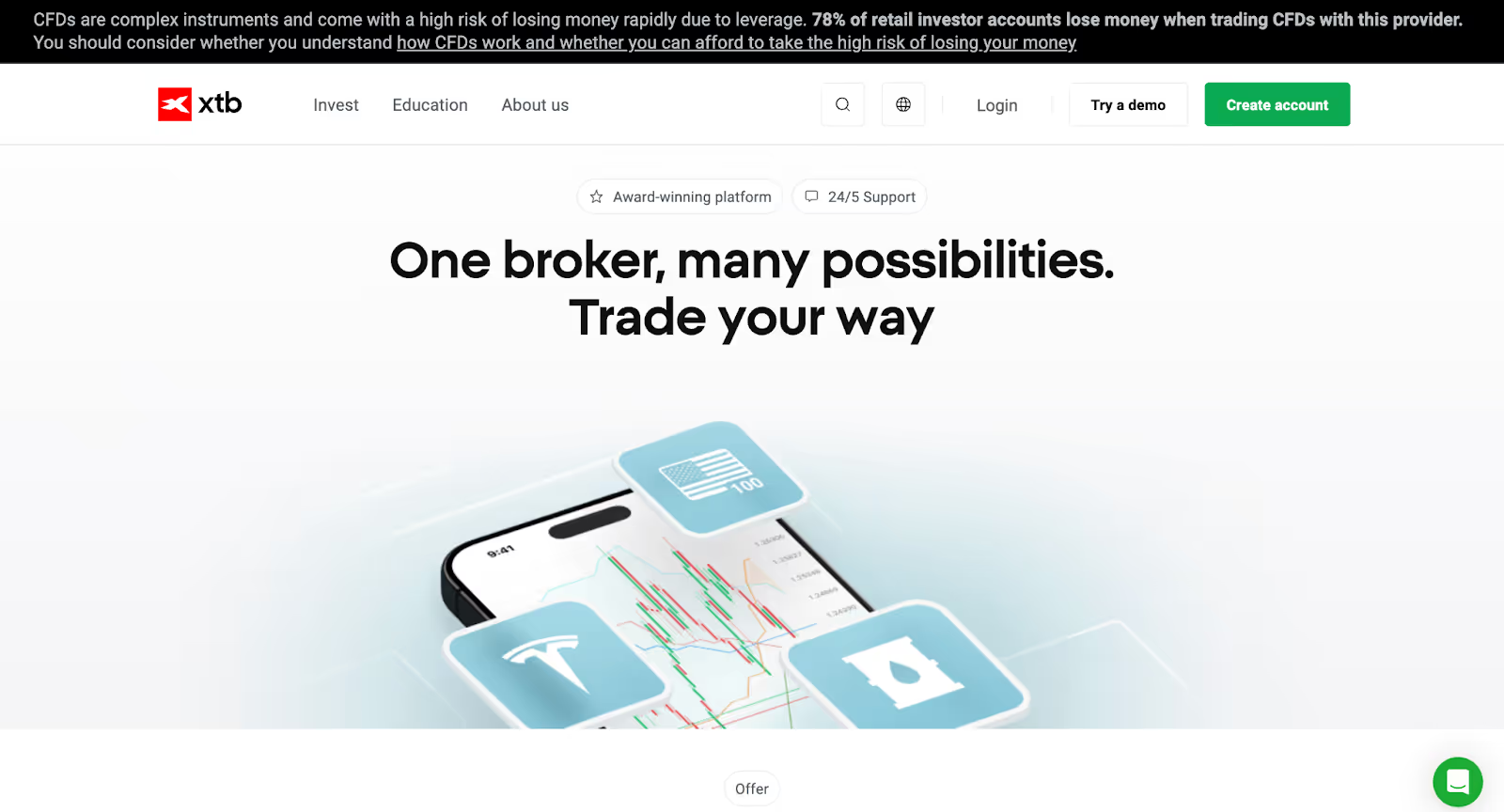
Founded in 2002, XTB is a publicly traded company listed on the Warsaw Stock Exchange and a global broker based in Poland, known for its robust trading app and extensive educational resources. It offers a wide range of over 7,000+ financial instruments, including stocks, ETFs, forex, commodities, and indices. The platform is particularly appealing to active traders and those interested in CFD trading. Built around the xStation 5 platform, it delivers fast CFD execution with no requotes, tight spreads (from 0.5 pips for forex), and real-time tools like custom indicators and market sentiment trackers, an ideal environment for active intraday trading.
For beginners, XTB offers a demo account that allows trading with virtual funds, providing hands-on experience with the platform. Also, XTB's xStation Mobile is a natively designed mobile app optimized for mobile trading with its full range of assets. Suitable for both beginners and experienced day traders based in Europe, XTB is probably best suited to intermediate-level investors.
Here’s a pricing snapshot for XTB’s trading costs:
- Forex: spreads from 0.5 to 0.6 pips (EUR/USD)
- Indices and commodities: variable spreads, often lower during peak liquidity
- Stocks/ETFs: €0 commission up to €100k/month, then 0.2% (€10 minimum)
For European investors, XTB offers commission-free trading on stocks and ETFs, with a monthly turnover limit of €100,000. Beyond this threshold, a commission of 0.2% (€10 minimum) applies. There is no platform fee to use XTB’s trading platform, and it doesn’t charge any fees for account maintenance or withdrawals exceeding €50.
XTB also pays interest on uninested funds and offers an eWallet, which provides a multi-currency card, allowing you to make payments without any account maintenance fees. One downside is that XTB charges an inactivity fee of €10 per month after one year of no transactions, and if no deposits have been made in the last 90 days.
XTB, under the subsidiary “XTB Limited”, largely operates under the supervision of the Cyprus Securities and Exchange Commission (CySEC) and the Polish Financial Supervision Authority (KNF). However, the country in which you’re accessing the app will dictate regulation and oversight. For example, if you’re based in Spain, trading with XTB will fall under Comisión Nacional del Mercado de Valores (CNMV), whereas in France it would be the Autorité des Marchés Financiers (AMF). Investors throughout Europe can access XTB's services through the European Union's passporting system, which allows financial firms regulated in one EU country to operate in other EU countries.
Learn more about XTB safety here: Is XTB safe for European investors?
In summary, XTB delivers a fast, feature-rich platform ideal for intermediate day traders, combining tight spreads, deep CFD product range, and institutional-grade technology, all with zero minimum deposit and flexible pricing.
If you want to find out more, you can read our in-depth XTB review.
Pros
- Fast, no-requote execution
- Tight raw and standard spreads
- Commission-free trading on stocks and ETFs (up to €100,000 monthly turnover)
- Advanced trading platform with comprehensive tools
- Natively designed mobile app optimised for trading
- Wide range of tradable instruments
- Extensive educational resources
- No account opening or maintenance fees
Cons
- Pro-level features may overwhelm beginners
- Currency conversion fee of 0.5%
- Pattern day trading restrictions may apply
- No MT4/5 support in many regions
- 0.5% currency conversion fee
- Limited product offerings for long-term investors
- Withdrawals under €50 cost €5
- Inactivity fee of €10 per month if your account is inactive for 12 months
Pepperstone
- Minimum deposit: €0
- Leverage: EU-regulated limits (up to 30:1 for FX; lower for other assets)
- CFDs: Forex, indices, commodities, crypto and shares
- Regulator in Europe: Federal Financial Supervisory Authority (BaFin)
- Demo account: Yes
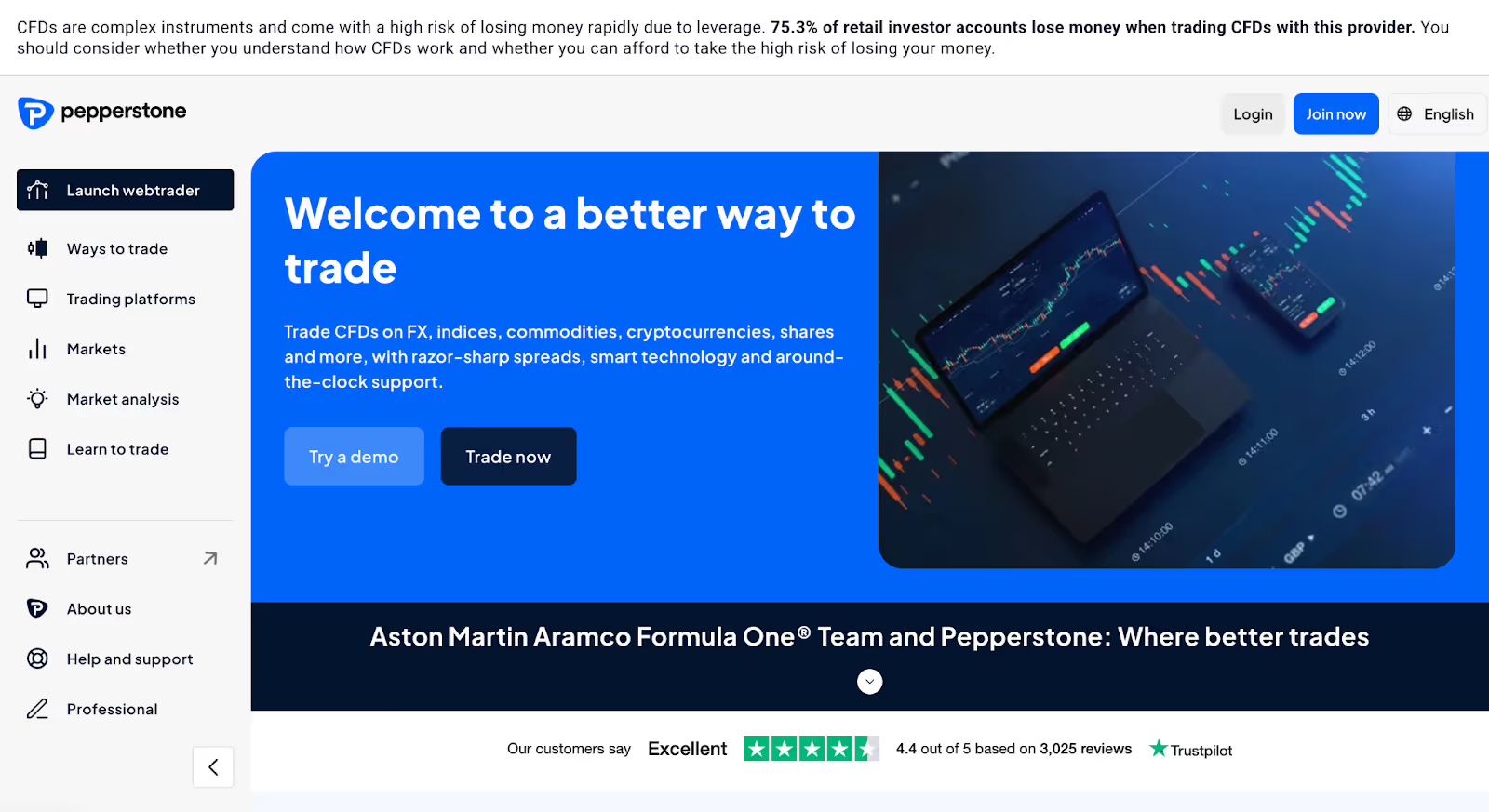
Founded in 2010 with a strong global presence, Pepperstone has rapidly earned a reputation for ultra-fast execution and razor‑tight pricing, making it a favourite among forex scalpers and CFD day traders across Europe.
Its key strength lies in excellent execution: raw-spread Razor account offers spreads from 0 pips on major currency pairs with a transparent commission, while the Standard account provides competitive swap-free spread-based pricing.
Multi-asset trading is seamless through platforms like MetaTrader 4/5, cTrader, TradingView, or Pepperstone’s own web interface, each delivering fast fills, deep liquidity, and robust technical tools.
Pepperstone EU Ltd is registered in Cyprus and operates under the supervision and regulation of the Cyprus Securities and Exchange Commission (CySEC). The firm aggregates quotes from Tier-1 banks, offering deep liquidity and industry-standard protections for EU retail clients.
In summary, Pepperstone is a top choice for European FX and CFD day traders, particularly those seeking to scalp or trade with high frequency. It delivers low-cost, lightning-fast execution across major platforms, backed by strong regulatory oversight and transparent pricing.
Pros
- Raw spreads from 0.0 pips with Razor account
- Multiple platforms including MT4/5, cTrader & TradingView
- Deep liquidity from Tier‑1 banks
- No commission on Standard account
- Day trading–friendly features like algorithmic tools and fast fills
Cons
- Requires commission with Razor account
- No copy trading tools
- No guaranteed stop loss
- Currency conversion or overnight fees may apply
- Limited share CFD selection compared to some competitors
Trading 212
- Minimum deposit: €1 (€10 for CFD accounts)
- Leverage: EU-regulated limits (up to 30:1 for FX; lower for other assets)
- CFDs: Forex, indices, commodities, and shares
- Regulator in Europe: Cyprus Securities and Exchange Commission (CySEC)
- Demo account: Yes
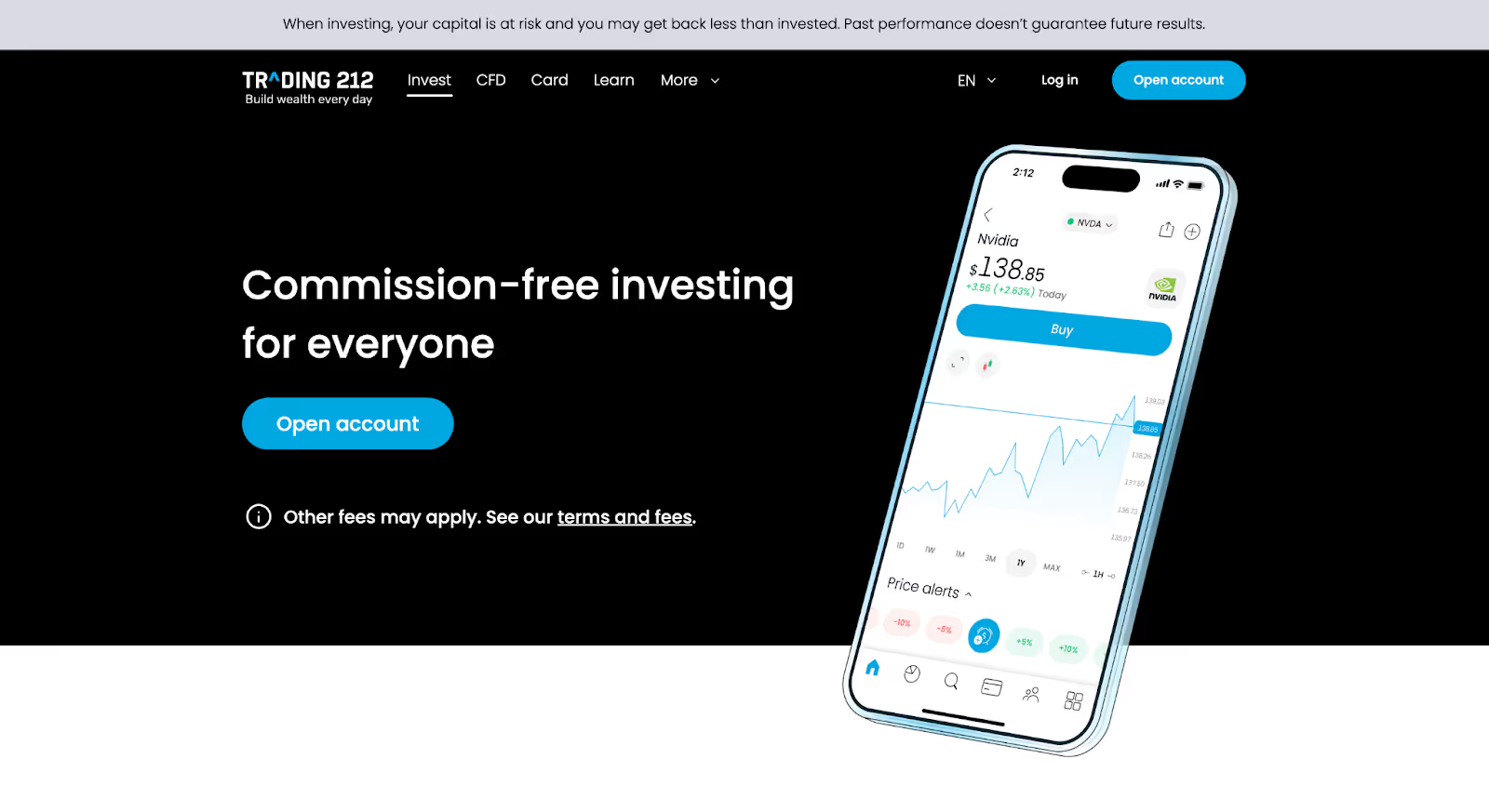
Trading 212 is a UK-based fintech company that offers commission-free trading on stocks, ETFs, and CFDs. The platform is designed to be user-friendly, making it suitable for beginners and casual day traders just starting out. The platform also offers a free stock worth up to €100!
Opening an account is quick and easy. Within the app, you will have access to three different account types:
- Trading 212 Invest: Allows commission-free trading of stocks and ETFs.
- Trading 212 CFD: Allows trading of leveraged financial products (CFDs).
- Trading 212 Crypto: For crypto investing.
Trading 212’s accounts support negative balance protection, and its fee transparency makes it simple to understand costs, even for high-frequency traders. While it lacks some professional-style tools and advanced order types, its demo account, detailed charts, and ultra-low barriers to entry make it a good testing ground for newcomers trying out day-trading strategies.
For European investors, Trading 212 provides access to a wide range of European and US stocks and ETFs. The platform charges a currency conversion fee of 0.15% when trading assets in a different currency from your base currency. The platform also supports fractional share trading and offers an automatic investment system, as well as its “Pies”, which enable you to build and share custom portfolios.
In Europe, Trading 212 operates under the supervision of the Cyprus Securities and Exchange Commission (CySEC). Check our in-depth analysis on the safety of Trading 212 if you want to know more.
In summary, Trading 212 is an ideal choice for beginners to intermediate European day traders seeking a user-friendly brokerage, offering a straightforward platform for day trading and commission-free investing.
Other resources about Trading 212:
Pros
- Low minimum deposit of €1/€10 and fee transparency
- Tight spreads (0.6 points on popular indices) and no commission
- Wide CFD market coverage: forex, stocks, indices, commodities, ETFs
- Unlimited demo account, ideal for practice
- Negative balance protection and strong EU regulation
- Commission-free trading on stocks and ETFs
- User-friendly mobile interface, easy for beginners
- Supports fractional shares and auto-investing
- Multi-currency account reduces FX costs
- Unique customisable Pies feature
- Offers a free fractional share worth up to €100 with a promo code
Cons
- Limited advanced trading tools for experienced traders
- Not ideal for professional scalpers; platform may lag under heavy use
- The mobile app is fairly basic in terms of charts and tools
- Limitations around charting and analytics compared to pro-grade platforms
- Fairly limited range of asset types
- Customer support can be slow during peak times
Plus500
- Minimum deposit: €100
- Leverage: EU-regulated limits (up to 30:1 for FX; lower for other assets)
- CFDs: Forex, stocks, indices, commodities, ETFs, crypto, options
- Regulator in Europe: Cyprus Securities and Exchange Commission (CySEC) and Estonian Financial Supervision Authority (EFSA)
- Demo account: Yes
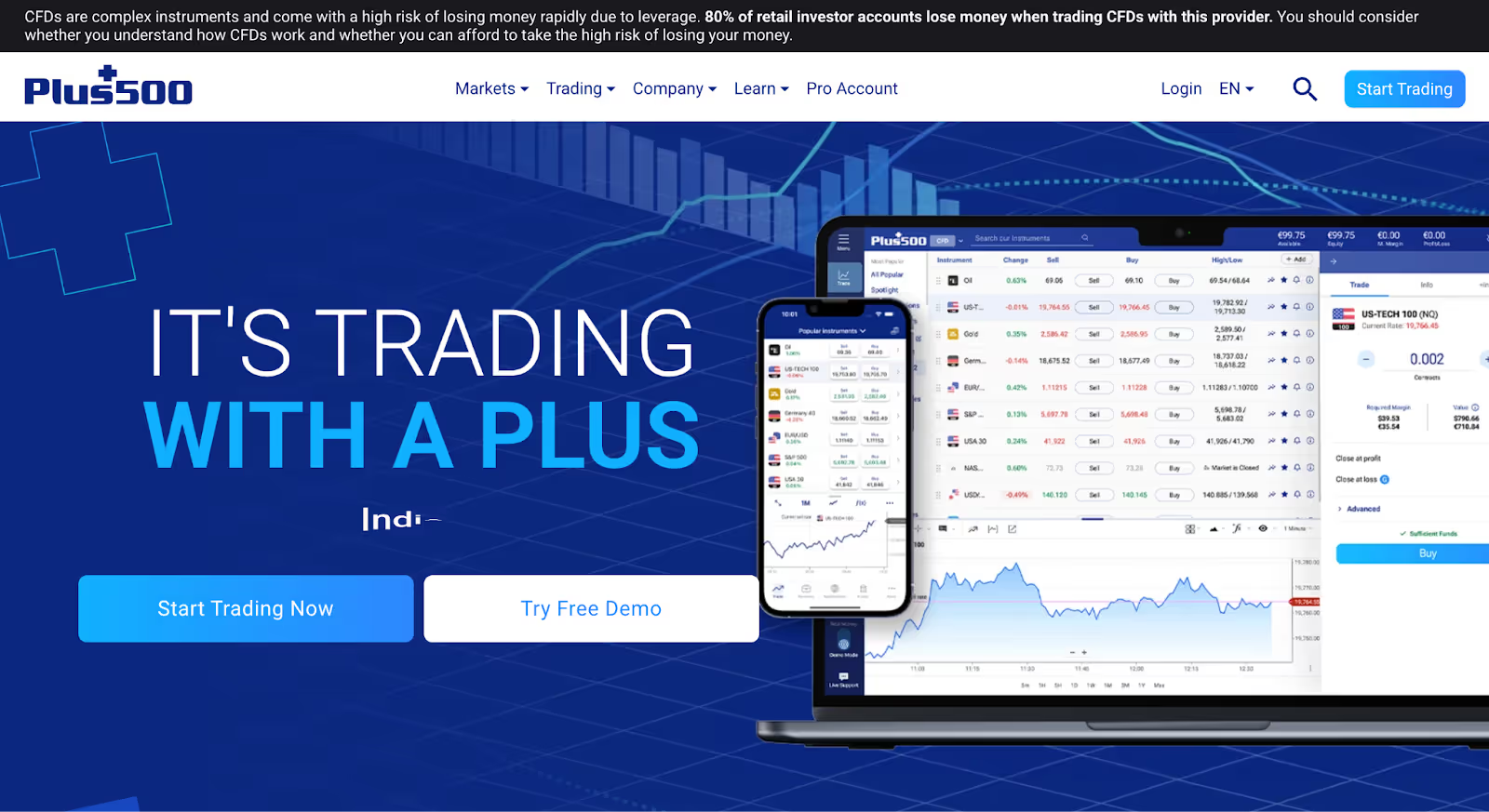
Founded in 2008 and listed on the London Stock Exchange (ticker: PLUS), Plus500 is a well-established CFD broker offering a straightforward, intuitive platform that appeals to day traders across Europe. It’s ideal for those who want fast execution, straightforward pricing, and access to a wide range of global markets through an intuitive proprietary platform.
Day traders using Plus500 can benefit from tight spreads, guaranteed stop-loss orders, and a fast, easy-to-use web and mobile interface. While it lacks third-party tool integration to use something like MetaTrader, its platform is fast and built specifically for CFD trading, especially useful for short-term traders focused on price action rather than advanced indicators or automation.
Similar to Trading 212, there’s an “Invest” or “CFD” account option. Here’s a brief explanation of some of Plus500’s key day trading fees in Europe:
- Forex spreads: variable, from 0.6 pips (EUR/USD)
- Stocks & indices CFDs: tight spreads, commission-free
- Currency conversion: Plus500 charges a 0.7% FX fee
- Real stocks: US shares are $0.006 per share, European stocks vary from 0.045% to 0.075% with a €2/€4 minimum, and UK shares are 0.045% with a £2 minimum.
In the EU, Plus500 is largely regulated by the Cyprus Securities and Exchange Commission (CySEC) and then the Estonian Financial Supervision Authority (EFSA) in Estonia. Client funds are kept in segregated accounts and protected up to €20,000 under the Investor Compensation Fund (ICF).
In summary, Plus500 is a strong choice for European day traders looking for a fast, frictionless, and simplified CFD trading experience with no commissions and a wide variety of markets, especially for those who prefer a minimalist platform.
Pros
- Wide selection of CFDs, including options and crypto
- Simple, user-friendly web and mobile apps
- Tight spreads and no CFD commissions
- Low commissions for trading real assets
- Negative balance protection
- Guaranteed stop-loss and trailing stops
- Listed company with strong financial transparency
- Free demo account
Cons
- No support for MT4/MT5, TradingView, or third-party trading platforms
- Limited price charting and customization
- Not suitable for advanced algorithmic trading
- There’s only a retail account option (no pro option)
- $10 Inactivity fee after 3 months
Criteria for the best day trading brokers in Europe
The brokers featured in our list were selected based on how well they serve European day traders, aka those who actively buy and sell assets within short time frames, often multiple times per day. Successful day trading requires platforms that are fast, cost-efficient, secure, and packed with powerful tools.
Here are the key criteria we used to determine the best brokers for day trading in Europe:
1. Security and asset protection (including uninvested cash)
All selected brokerages available in Europe are regulated by a European Union regulator. We also analyzed fund protection mechanisms, such as deposit insurance or account segregation, to ensure that investors' assets are properly safeguarded.
2. Costs, spreads and commissions
Day traders execute frequent trades, so fees can quickly add up. We closely evaluated:
- Spreads (especially on major forex pairs and indices)
- Commissions (per-share or per-contract)
- Overnight financing (swap/rollover) costs
- Currency conversion fees
- Inactivity or platform usage charges
Platforms with low spreads, tiered pricing models, or commission-free trading on key products scored highest.
3. Execution speed and market access
For day traders, speed matters. We favoured brokers offering:
- Fast order execution
- Direct Market Access (DMA), where available
- Level 2 market data
- Minimal slippage
- Access to liquid global markets for stocks, forex, indices, commodities, and CFDs
We also gave priority to brokers with high uptime and professional-grade trading infrastructure.
4. Trading tools and platforms
Whether you trade from a desktop or mobile device, tools make a difference, so we assessed:
- Charting capabilities (number of indicators, drawing tools, signals, etc.)
- Availability of advanced order types
- Algorithmic or API trading support
- Customizable dashboards and layout
- Risk management features
Brokerages supporting MetaTrader 4/5 or proprietary platforms, such as CMC’s Next Generation or IBKR Mobile, scored highly here.
5. Quality of customer support
Customer support can make a difference in critical trading situations. We analyzed availability, speed, and effectiveness in resolving issues, as well as the available communication channels - whether that’s in-app chat, email, or over the phone and how many days support is available.
Investor compensation scheme
The Investor Compensation Scheme (ICS) is the last safeguard for investors. When everything goes wrong, the ICS steps in to provide protection.
In the table below, we highlight the regulators of origin for each broker and the coverage limits (those applicable to European investors):
Choosing the best day trading broker in Europe
Finding the best broker for day trading in Europe depends on your experience level, preferred asset classes, and trading strategy.
If you're looking for professional-grade platforms and low commissions, Interactive Brokers is excellent. For forex-focused traders, Pepperstone offers tight spreads and excellent execution. If you prefer CFD-based trading on a wide range of markets, Plus500 and XTB provide both variety and speed.
Meanwhile, Trading 212 and eToro appeal more to casual traders or those who want social or mobile-first trading.
Regardless of your choice, always consider cost efficiency, speed, tools, and regulation. A strong day trading setup doesn't just reduce friction; it gives you a competitive edge in fast-moving markets.
Disclaimer: This content does not constitute investment advice; it is provided solely for informational and educational purposes. Contracts for Difference (CFDs) and other derivative instruments are complex products that employ leverage and therefore involve a high risk of rapid capital loss. Public data indicate that between 69 % and 83 % of retail investor accounts lose money when day-trading leveraged products with brokers such as XTB, Pepperstone, Interactive Brokers (IBKR), Plus500, and Trading 212. Before trading, make sure you fully understand how these products work and whether you can afford to lose your entire investment.





